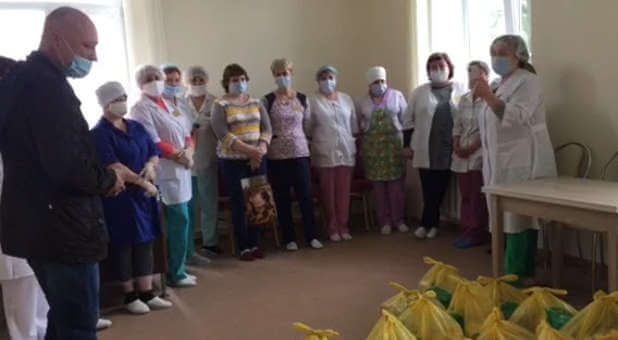Christians in Russia—the world’s largest country stretching across nine time zones—are discovering that a single bag of groceries can pave the way for the gospel to change people’s lives during the COVID-19 pandemic.
Thousands of evangelical churches are hand-delivering groceries to the most vulnerable people in their communities—from the capital, Moscow, to the small towns and villages of the frozen Siberian tundra.
They’re not only surprising their neighbors with food packages—but they’re also sharing the gospel with many who’ve grown up in a spiritual vacuum with no knowledge or understanding of God.
“Across Russia and the former Soviet Union, millions of people live with no hope,” said Michael Johnson, president of Illinois-based Slavic Gospel Association.
SGA partners with more than 6,300 evangelical churches in 10 nations in the vast region to deliver compassionate aid hand-in-hand with the gospel to the exact point of need.
‘Greatest Opportunity Since Fall of Communism’
“This is the greatest opportunity since the fall of communism for evangelicals to share the gospel message and the love of Christ in word and action,” Johnson said. “We hear stories of changed lives every day.”
Supported by SGA, evangelical churches across Russia and the former Soviet Union have proven to be a lifeline for thousands since the pandemic started in March. Russia has the fourth highest number of confirmed coronavirus cases—more than 780,000 and climbing daily.
In a nation where only one percent of the population is evangelical Christian, local believers are seizing the opportunity to “let their light shine” by visiting their neighbors—including widows, orphans, elderly shut-ins and those with disabilities—sharing food packages and having conversations about Jesus.
In response to the vast practical and spiritual needs in Russia and neighboring countries, SGA has launched a global campaign called “Christ Over COVID“—calling for prayer and urgent relief.
So far, Russian congregations supported by SGA and its donors in America have delivered enough groceries to provide more than 1.5 million free meals.
In Pokrovsk, a town in the far east of Russia, church members gave groceries and a Bible to Natalya, a mother of five abused by her alcoholic husband. Known for their love of vodka, more than 40% of working-age men in Russia die from drinking too much alcohol.
Local believers shared the gospel with Natalya and her husband’s brother, Sergei, and prayed with them. As a result, Sergei gave his life to Christ, and Natalya’s husband stopped drinking and got a job.
COVID-19 ‘Opening Hearts’ to Gospel
“Right now, the Holy Spirit is using COVID-19 to open hearts to the gospel like nothing we’ve seen since the fall of the Iron Curtain,” Johnson said.
As the number of coronavirus cases continues to climb, the stress on Russia’s health care system is overwhelming.
Members of a local evangelical church recently delivered 500 food packages to front-line medical workers caring for COVID-19 patients at a hospital in Tula, 120 miles south of Moscow.
The pastor also handed out Bibles, and told the health care workers: “We’d like to share with you that God loves you very much.”
In Russia, hospital staff often work in terrible conditions and are typically paid less than schoolteachers.
“We wish there were more people of light like you,” a hospital worker told church members.
“Right now, millions of Russian families are in dire straits, with no safety net or stimulus package to help them,” Johnson said. “Even in normal times, the average monthly salary in Russia is about $500, with many surviving on much less.” {eoa}
Founded in 1934, Slavic Gospel Association (SGA, sga.org) helps “forgotten” orphans, widows and families in Russia, the former Soviet countries of Eastern Europe, Central Asia and Russian-speaking immigrants in Israel—caring for their physical needs and sharing the life-transforming gospel of Jesus Christ. SGA supports an extensive grassroots network of local evangelical missionary pastors and churches in cities and rural villages across this vast region.











































